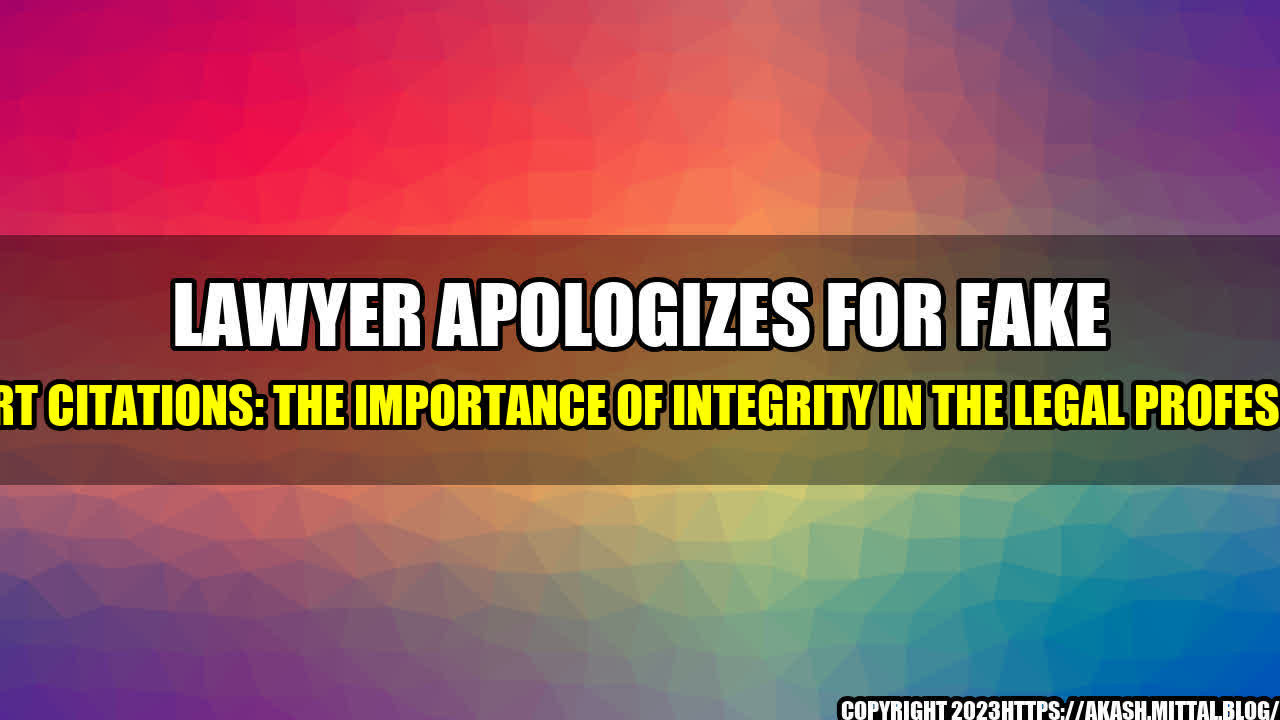What Happened?
In July 2021, it was reported that a lawyer in Illinois had used fake court citations in legal briefs submitted to courts. The lawyer, who had been practicing for over 30 years, apologized for the mistake and said that it had not been his intention to deceive anyone. However, the incident raised concerns about the integrity of the legal profession and the importance of ensuring that all legal arguments are based on accurate and truthful information.

The Importance of Integrity
Integrity is a fundamental value in the legal profession, as it is essential for fostering trust between lawyers and their clients, as well as between lawyers and the courts. Without integrity, the legal system would not function properly, and justice would be compromised. Lawyers have a duty to be truthful and honest in all their dealings, and to ensure that the information they present in court is accurate and based on reliable sources.
Moreover, lawyers who lack integrity risk damaging their credibility and reputation. A single instance of dishonesty can have far-reaching consequences, potentially leading to disciplinary action, loss of clients, and damage to their career prospects.
The Consequences of Unethical Behavior
The Illinois lawyer's use of fake court citations may seem like a minor mistake, but it has significant consequences for the legal profession. Firstly, it undermines the credibility of the legal system by casting doubt on the accuracy of legal arguments. If lawyers are allowed to manipulate the facts or cite non-existent cases, then how can we trust that justice is being served?
Secondly, unethical behavior by lawyers can harm their clients. If a lawyer presents false information in court, then their client may lose the case, face fines or other penalties, or even go to jail. Furthermore, if a lawyer is discovered to have acted unethically, it can damage their client's reputation and undermine their ability to do business.
Thirdly, unethical behavior by lawyers can harm the legal profession as a whole. It can erode public trust in lawyers and the legal system, leading to a loss of respect and support for the rule of law. It can also encourage other lawyers to engage in similar behavior, creating a culture of dishonesty and manipulation.
Practical Tips for Maintaining High Ethical Standards
While most lawyers are committed to upholding high ethical standards, it can be challenging to maintain those standards in the face of pressure to win cases or meet billing targets. Here are some practical tips for lawyers who want to ensure they remain ethical:
- Be honest with your clients: Don't make promises that you can't keep, and don't overstate the strength of your client's case. Be clear about the risks and potential outcomes of the case
- Be careful with your research: Double-check all your legal research to ensure that your arguments are based on accurate and reliable sources. Don't rely on unverified information or fake citations.
- Seek advice from colleagues and mentors: If you're not sure about an ethical issue, seek advice from a colleague or mentor. Don't hesitate to ask for guidance if you're not sure about the right course of action
- Be transparent in your billing: Don't overbill your clients or charge them for unnecessary work. Be clear about your fees and the services you provide.
Conclusion
The recent controversy surrounding the Illinois lawyer's use of fake court citations has highlighted the importance of integrity in the legal profession. Without integrity, the legal system cannot function properly, and justice is compromised. While most lawyers are committed to upholding high ethical standards, it can be challenging to maintain those standards in the face of pressure to win cases or meet billing targets. However, by being honest with their clients, careful with their research, seeking advice from colleagues and mentors, and being transparent in their billing, lawyers can maintain high ethical standards and ensure that they uphold the trust of their clients and the courts.

Curated by Team Akash.Mittal.Blog
Share on Twitter Share on LinkedIn